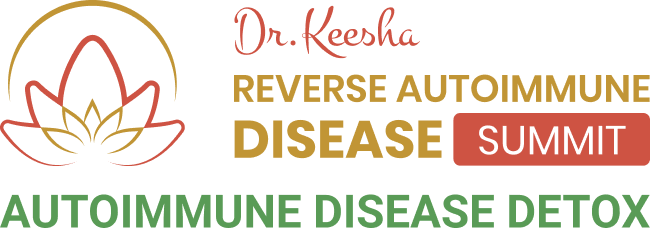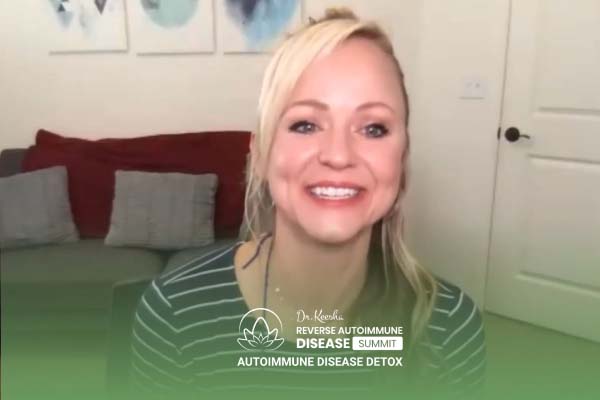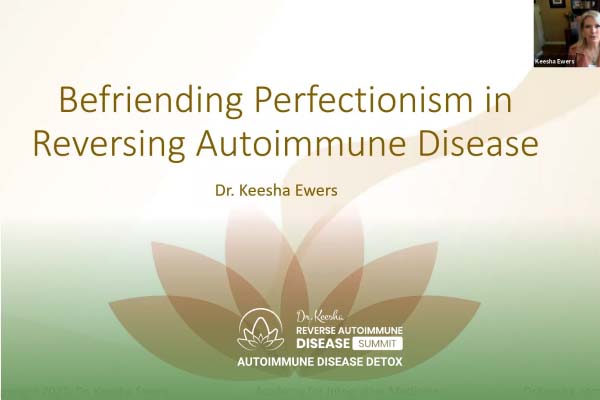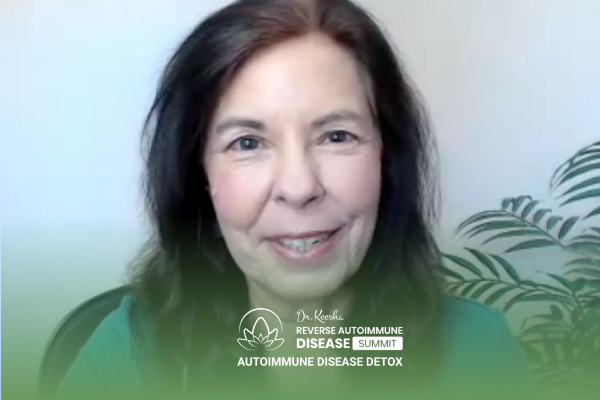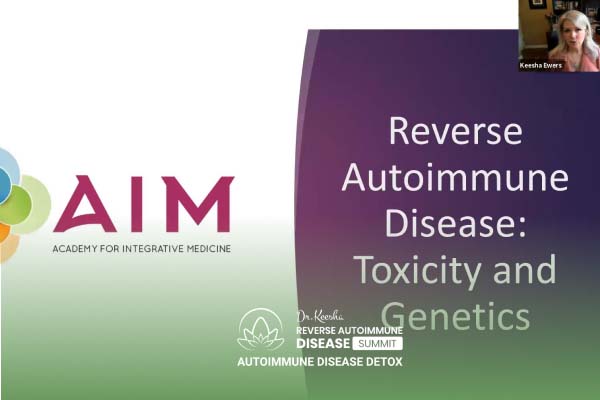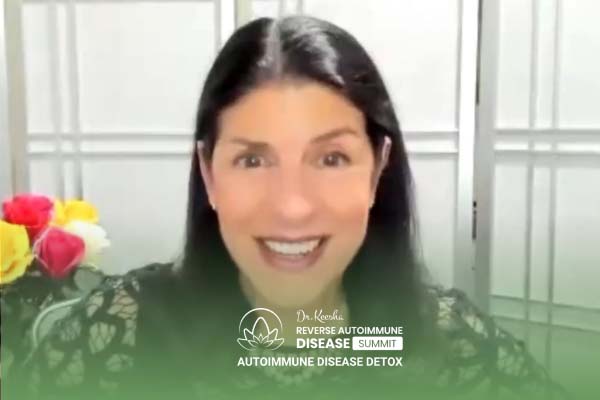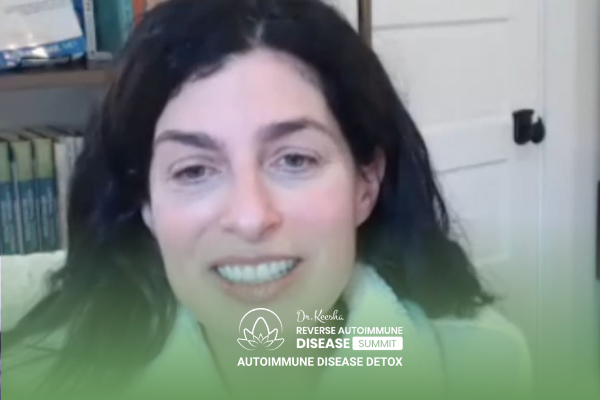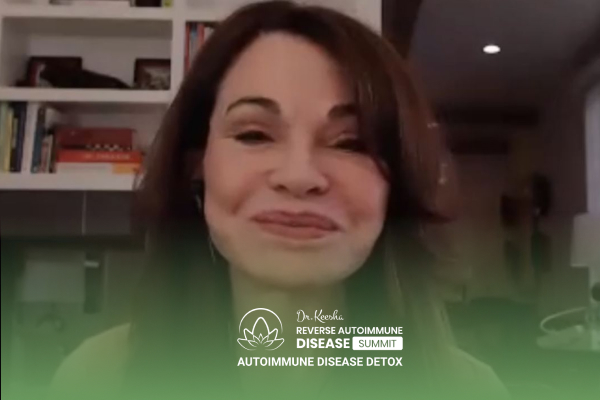Join the discussion below
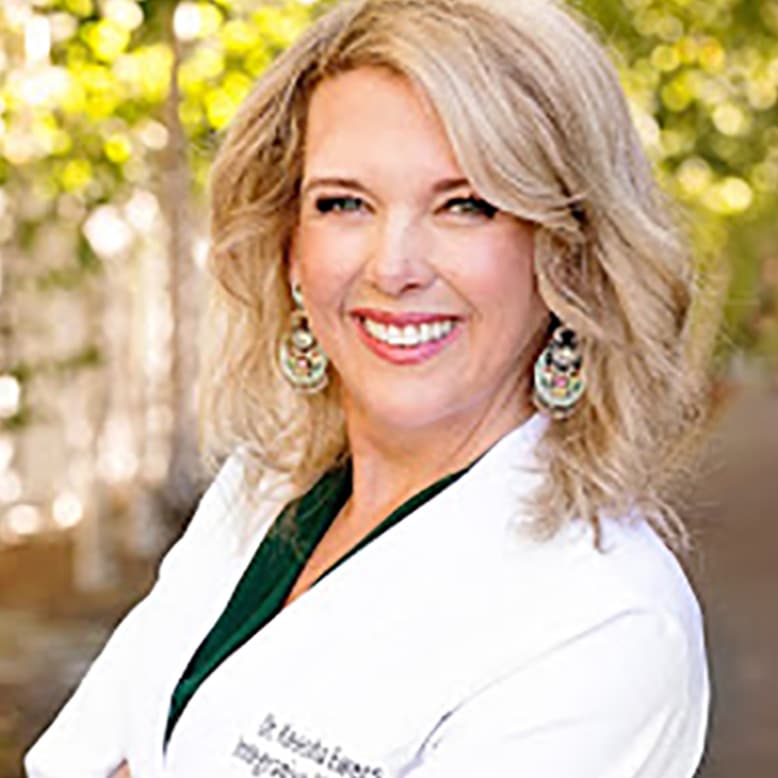
Keesha Ewers, PhD, ARNP-FNP-C, AAP, IFM-C
Dr. Keesha Ewers is an integrative medicine expert, Doctor of Sexology, Family Practice ARNP, Psychotherapist, herbalist, is board certified in functional medicine and Ayurvedic medicine, and is the founder and medical director of the Academy for Integrative Medicine Health Coach Certification Program. Dr. Keesha has been in the medical field... Read More
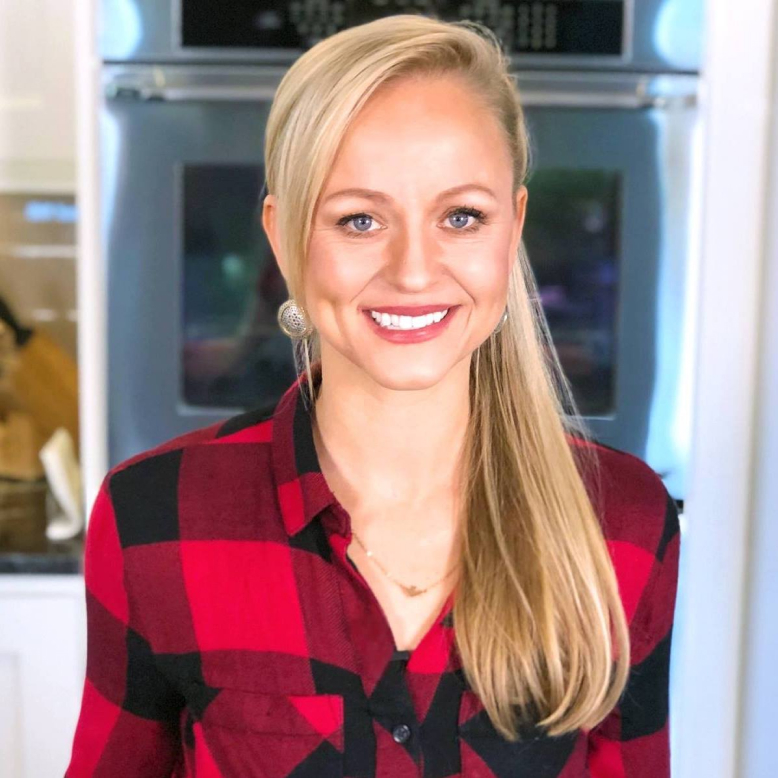
Autumn Fladmo Smith began her academic career with a Bachelor's degree in psychology and a minor in dance from the University of Montana. Upon graduation, Autumn danced professionally while becoming a certified yoga instructor. Hoping to combine her love of dance with her passion for health, Autumn became a celebrity... Read More
Keesha Ewers, PhD, ARNP-FNP-C, AAP, IFM-C
Welcome back to the “Reverse Autoimmune Disease Summit Series,” everybody. I’m Dr. Keesha, and you’re joining me for the fourth iteration of the Reverse Autoimmune Disease Summit Series.” And we’re talking about this time, the autoimmune detox. And I’m so excited. I ran several years ago. I don’t even know how long ago, it was ago, Autumn. In 2016, yeah, the “Woman’s Vitality Summit Series,” and you guys were sponsors for that. And it was the first time I was introduced to you. So that’s been some years now. So I’m so excited to bring you, an old friend. Autumn Fladmo Smith, who is the co-founder of Paleo Valley and Wild Pastures. She holds a Master’s Degree in Holistic Nutrition.
She’s a Certified Eating Psychology Coach. And is a certified FDN practitioner. Her passion for health began with her own struggles with irritable bowel syndrome and anxiety. Despite a career as a professional dancer and celebrity fitness trainer, Autumn’s own health was in shambles. Desperate for a cure, she and her husband Chaz stumbled upon the Paleo Diet in 2011. And within a month of beginning of her health was completely transformed. Autumn then made it her mission to share the information she’d learned with as many people as possible. And she’s the co-founder of Paleo Valley which is an organic whole food supplement, and paleo snack food company that prioritize nutrient density and food quality. In 2018, she took things a step further and launched her second business with her husband, Wild Pastures, which is a regenerative pasture based meat delivery service. Wild Pastures makes supporting sustainable agriculture and local small farms easy for consumers. She lives in Boulder, Colorado with her husband and their son, Maverick. Welcome back to the Summit Series. We’re not doing women’s vitality this time, but we are, ’cause 80% of all autoimmune diseases are diagnosed in women.
Autumn Smith M.S., FDN-P
Oh that’s so sad.
Keesha Ewers, PhD, ARNP-FNP-C, AAP, IFM-C
So it’s like this food thing. I think not to be gender biased or specific, research shows that women make most of the consumer decisions in any given family. And so when we’re talking about food supply, I think it is such an important message to get across to anyone that has a family, and also for themselves, for their own individual health. And so you’re here as in an autoimmune detox summit to talk about our food supply. And what does this have to do with anything? What are the toxins in our food supply and what do we need to be made aware of? And I’m so excited to talk to you about this.
Autumn Smith M.S., FDN-P
Thank you so much old friend for having me. I loved being on the vitality, Women’s Vitality Summit. I’m excited to be here and there isn’t a topic I’m more passionate about, because changing literally changed my life. So I’m excited to hopefully share some of the insights I’ve gathered in the 10 years.
Keesha Ewers, PhD, ARNP-FNP-C, AAP, IFM-C
Yeah, so there’s a study that just popped in my head and it generated a whole forks over knives, right? Like really talking about meat being bad for you. And I think what I would like to start with is that we have such black and white thinking when it comes to anything I think in our country culture. It’s like, that’s good, that’s bad. Instead of getting all the information, which is yes, meat, the way that we raised it, and the way that we’ve done it in the last 20 to 30 years has really, really made our culture toxic. And we can point to it as being problematic in things like cancer, and heart disease, and autoimmune disease. That it’s not the meat, it’s the way that it’s been raised. So what are the toxins inside of our food supply that are making us sick? And without saying, oh, you should just be vegetarian or you should just be a carnivore. It’s like, no, there’s so much more to this, right?
Autumn Smith M.S., FDN-P
Absolutely, I love that you brought that up, because that was one of the biggest factors for me and my mental health challenges and irritable bowel syndrome. I avoided animal products ’cause I thought they were bad. And because of that, I was on this blood sugar roller coaster. I was using all of these processed products. I mean, I had no idea. And so that was one part of it. But what I, one of the most pressing issues I see with animal agriculture specifically now, there hasn’t ever been a culture that has not eaten some kind of animal product. And I think that’s important to recognize.
Also nutrients in animal products are more bioavailable. And I know some people are doing this for ethical reasons or, and that’s a different thing, but when it comes to health and the environment I think animal products are really important and even more so the way your animal products are raised is very important. So one of my biggest issues is antibiotic resistance, right? So if you eat an industrial raised animal today, it’s definitely usually raised with antibiotics. Now in back in 2013, the FDA came in and said, I don’t think it’s a good idea for antibiotics to be used in animals to promote weight gain, but what they didn’t do is really regulate it. So it’s still being done under the guise of, okay we’re just preventing infection in these animals now.
But when antibiotics get into our food supply, most of them are actually being used in animal agriculture, it increases the risk of antibiotic resistance. And that’s a big deal. Like by 2050, it’s estimated that that could kill more people than cancer. And you know that it’s not doing anything good for our microbiome, right? Antibiotics in our food are destroying our microbiomes. Our microbiomes play a large part in whether we do or do not develop autoimmune diseases. So what we know is that conventionally raised animals according to a ConsumerLabs report are about two times more likely to contain antibiotic resistance bacteria. So what we wanna do is just support farmers and ranchers who are raising animals without antibiotics. And this isn’t cruel.
A lot of times what they do with these programs is if an animal gets sick, they get treated with antibiotics and then they’re removed from that program. And so animals are still being treated well, but a lot of farmers are not doing it in that way. There’s other things, growth hormones, Ractopamine, all of these things that are actually not allowable in other countries are still being done in America. So those are one things, Animal products, the quality of them, not only what you’re not getting, but also in terms of the nutrient density that you will be getting when animals are raised on pasture or with really responsible non-GMO feeds if they’re pigs or chickens, which sometimes happens.
The other really cool thing is with the way we raise animals, and with the way we’re farming today, we can actually reverse this epidemic of hidden hunger. So the amount of nutrients that you have is a really big predictor of how well your immune system works and responds and is modulated. And for the last 50 years, our nutrient levels have been on the decline. And that’s again, because of the way that we’re farming, and because of the way that we’re raising animals. And so if we can come back to regenerative practices and restore the soil biology that actually the microbes in the soil are what brings the nutrients to the plants. And so if that’s not happening because of fertilizers or because of chemicals or because of tilling, then the animals that are eating the plants, they’re not nutrient dense, the plants are not as nutrient dense, and then we’re not as nutrient dense.
Keesha Ewers, PhD, ARNP-FNP-C, AAP, IFM-C
Or monocropping and monopasturing too, right?
Autumn Smith M.S., FDN-P
Exactly.
Keesha Ewers, PhD, ARNP-FNP-C, AAP, IFM-C
We don’t get that like chickens coming along after cattle have been there, and adding in a different diverse and then planting a plant in that pasture and having a crop there, like this is biodynamic farming, right?
Autumn Smith M.S., FDN-P
Exactly and biodiversity. We don’t want these things all siloed. We don’t want the industrial agriculture and the monocrop industrial, so we need to bring it all together. And there’s a lot of really cool research around or vet generative agriculture. I can share if you want, but while we’re on this note, just like finding a regenerative farmer in your area and being really curious about the practices that are being used is really important, because we only have about 60 years of top soil left. And so we need to rebuild our soil for future generations. And the other things I’m really concerned about are just around what’s hiding in our food and the extensive lobbying practices that kind of keep us in the dark.
Keesha Ewers, PhD, ARNP-FNP-C, AAP, IFM-C
Before we go there, because this is going to be a really important subject. I just wanna put a plug for if you’re local to the Seattle area, Jubilee Farms has a biodynamic farm. So it’s, like you can go online and look for these local farmers by using the term biodynamic, which is what I did after hearing a talk, Autumn, similar to this and going, oh, I never knew this.
Autumn Smith M.S., FDN-P
Yeah.
Keesha Ewers, PhD, ARNP-FNP-C, AAP, IFM-C
Like we don’t know this stuff, right?
Autumn Smith M.S., FDN-P
It’s true, right? Like how can we? Like we have lives, we’re in the middle of pandemic, were like surviving-
Keesha Ewers, PhD, ARNP-FNP-C, AAP, IFM-C
And we’re, a lot of us aren’t farmers, and so it’s not something that we’ve been needing to have language around. So we’ve gotten away from family farms, and family gardens and family, right? As we give it over to the agricultural industry and that’s, we gotta reclaim some knowledge around this. This is really, really important. Yeah.
Autumn Smith M.S., FDN-P
Yeah. And I just want to give a few other resources like Local Harvest is a great one. Eat wild is a great one. And then our business Wild Pastures is a meat delivery service, and so we’re finding farmers and ranchers doing the right things in their bio region. But yeah, and it’s really scary to think that just if something goes wrong with these really centralized and industrialized farms, like we could be cut off from that. Like we need a local, we need food sovereignty, we need a local food supply. And so supporting those around you is really really an important piece of this, for sure.
Keesha Ewers, PhD, ARNP-FNP-C, AAP, IFM-C
Yeah, that’s such a good point. Oh my gosh.
Autumn Smith M.S., FDN-P
I know right.
Keesha Ewers, PhD, ARNP-FNP-C, AAP, IFM-C
‘Cause in the Seattle area, I think every area in the world has its own threat to communication with the rest of the world. So obviously San Juan Island is an island, and so the ferry system breaks down and there it is. But Seattle itself and the Pacific Northwest coastline they’re always talking about the tsunami that’s going to eat Seattle. And so you can kind of think about all the different reasons in your region that mother nature can bring something that cuts us off from our food supply. So this becomes really, really important.
Autumn Smith M.S., FDN-P
It does, yeah. Farmer’s markets, go there, be really involved in your local food scene. So important. And there’s also like a lot of greenwashing when it comes to labeling of animal products. And we can get into that too. But yeah, biodynamic farms. If you can find a regenerative farm, even if you find grass fed. That term isn’t always regulated, but a hundred percent grass fed is generally better for eggs pastured, and chickens, and pork. Those are definitely the things, but yeah getting to know your farmer is the best thing that you can ever do. And I learned this really cool trick when I was in California, and I didn’t always have time to like drive out to the farms. One of the farmers told me if you go to Google Earth, if you talk to the farmer at a farmer’s market and you look them in the eye and say, “Where’s your farm?” And then they can tell you about it, tell the location. You can actually look and see. Like are there animals on pasture? Are they being rotated or not? It’s a way that you can kind of get more access, even if you don’t have it direct access.
Keesha Ewers, PhD, ARNP-FNP-C, AAP, IFM-C
Okay, so let’s talk about, well, you brought up greenwashing. Let’s go ahead. I’ve never heard that term. I’m curious now, so.
Autumn Smith M.S., FDN-P
Oh!
Keesha Ewers, PhD, ARNP-FNP-C, AAP, IFM-C
Explain that. I can pretty much guess what it is, but let’s hear it.
Autumn Smith M.S., FDN-P
Oh, greenwashing is just rampant in the industry as a food manufacturer. It just like, it makes me so angry, because companies, large companies, know that people are kind of waking up to the power of food as medicine and they’re becoming more interested. And so they’ll just use their packaging to kind of like hint that, like they find the buzzwords. Basically they say something like cage-free for chicken. Okay, yeah. So cage free, that sounds pretty good. But what that only means is that you have access, you could be in this huge barn with cement with thousands of other chickens and you never go outside, but cage-free means you have access.
There might be a small door off in the distance. Okay, so cage free. That’s one of them basically. All vegetarian fed is another one. If this is for chickens and pigs, like they’re not vegetarians. This is not necessarily a good thing, right? Humanely raised is another one. A lot of times this isn’t regulated. You want certified humane and then grass fed. A lot of cows, every cow, is going to be grass fed for the beginning of its life. What you need to ask them is, are they ever fed grain? ‘Cause that’s the one. Even companies that are making products out there, right?
Keesha Ewers, PhD, ARNP-FNP-C, AAP, IFM-C
Yeah, I see.
Autumn Smith M.S., FDN-P
Yes.
Keesha Ewers, PhD, ARNP-FNP-C, AAP, IFM-C
So they have some grass, but then they also are fattened up on grain. Oh, I get it, okay.
Autumn Smith M.S., FDN-P
Yeah, and no one’s regulating it. And so it was like, oh okay. Well, ’cause that’s what happened with our collagen bone broth powder, because we were very familiar with the people supplying collagen. And we knew that everyone’s saying grass fed, grass fed, and we’re like, well, this, no, a lot of this is imported. This is not happening. And we called them, and it wasn’t. But I don’t think everyone has a malicious intent. I just don’t think they know to ask. And I don’t think they visit.
They actually dig deeper. But, and this happens with foods too, like aside from animal products, when it comes to like hidden sugar or like kids’ cereals or whatever, like low fat. It’s like, ugh, but what else is in there? And why are we allowed to hide sugar under 60 different monikers? And why can sugar be listed in five different ways on a label, just so it doesn’t actually show up as the first ingredient even though it’s in the highest proportion? So greenwashing is just basically that. Food manufacturers, it’s like a first date or like, it’s that version of you you show people the first time you meet them, not the truth of the matter.
Keesha Ewers, PhD, ARNP-FNP-C, AAP, IFM-C
Mira Dessy did a whole pantry, detoxing your pantry, and she talked about some of this. And so I’m, it’s so important. Like these things that you’re bringing up are the tricky ways that manufacturers use their labels to put us back to sleep.
Autumn Smith M.S., FDN-P
I know.
Keesha Ewers, PhD, ARNP-FNP-C, AAP, IFM-C
It’s like, it’s all okay, it’s all okay. You don’t need to inquire any further. See, smoke and mirrors.
Autumn Smith M.S., FDN-P
And I wanna make it really, yeah, and I wanna make it really hard to read, and it’s gonna be small and smushed together and the font is going to be illegible and yeah.
Keesha Ewers, PhD, ARNP-FNP-C, AAP, IFM-C
Yeah.
Autumn Smith M.S., FDN-P
It’s just on and on.
Keesha Ewers, PhD, ARNP-FNP-C, AAP, IFM-C
Yeah, so let’s talk about those ingredients. Like I would love to hear your journey, because you’ve started two businesses inside of this industry. And I’m super curious about like your experience of doing that. I mean, you were a dancer. Dancer turned farmer? How? I get your health journey, but what’s the experience of actually becoming a food manufacturer and what you’ve run up against, and how hard is it to get the stamps on your label that you have there, that are not greenwashed.
Autumn Smith M.S., FDN-P
Yeah, it’s really hard. Let me tell you. If it weren’t, if I didn’t have the experience that I had with food actually transforming my health, I can see how these bigger companies, oh we’ll just make one compromise here, and then all of a sudden we’ll make one here, because of our bottom line, and it doesn’t seem like that big a deal. If it didn’t matter to me so much, because it transformed my health, I would probably be in the same boat. But it did, and so I’m not. And so we always prioritize health over profit. And I’ll just tell you this story of our first product as like a really good example. So I did come out of the fitness world and I was traveling around the world a lot, and I realized, okay, well when I went on tour, actually.
I went on a world tour in 2012, and I had just discovered paleo. And I was like, okay, well I just know these grass, I need grass fed beef sticks, I need a protein source. I’m in a different country every day. And so I had Chaz, my husband, bring over a suitcase of beef sticks. Grassfed beefsteaks to Paris when he visited me and I ate them, and still got this like digestive upset stuff. And I was like, what is happening? And so when I got back to the United States, I looked into this. I was like, okay I guess I’m going to have to become a food manufacturer, because I want to maintain the way that I feel now.
And I wanna be able to feed my child this too. And so what I found out is there’s an ingredient called encapsulated citric acid in the beef sticks. And what this is, is it’s actually made with citric acid often derived from mold, and then the citric acid often derived from corn. And then the hydrogenated or encapsulated part is they encapsulate it in trans fat or hydrogenated oil. And they make these little beads that when you put the beef together, you put the beads in the meat and then it melts in there. And that preserves the project, or product, because it drops the pH.
And they were telling me, “Oh, it’s not a big deal. You can just label it citric acid, like nobody even bats an eye at that.” And I’m like, but we’re still potentially eating hydrogenated oils and GMOs. And for me, that’s just not going to work. And so I literally had to call hundreds of people, hundreds of manufacturers, and no one wanted to ferment them which is the alternative I came up with because I knew our ancestors had been eating meat forever, because it takes four times longer to ferment something. It is not lucrative, but we did find one. We found one manufacturer willing to do it. And so that’s just how we made our beef sticks and even though-
Keesha Ewers, PhD, ARNP-FNP-C, AAP, IFM-C
And pause for a second, because they are delicious. And the mouth feel between a very famous beef stick I used to use around the same time, and then the one you introduced to is radically different. ‘Cause you can actually see and taste those little nodules. They don’t melt completely.
Autumn Smith M.S., FDN-P
Yeah.
Keesha Ewers, PhD, ARNP-FNP-C, AAP, IFM-C
Yeah, and yours don’t have that. And they they taste good and they feel good inside of your body. So you can actually really tell the difference between these two ways of doing things.
Autumn Smith M.S., FDN-P
Absolutely. It’s not like a jerky, it’s like a smoisture with the snap. It’s like kind of like a Hickory smoked summer sausage. And it’s interesting because I was telling people about this since we made our beef sticks, a long time ago. There was actually a recent paper that came out, showing that people seem to be reacting to this ingredient with inflammatory conditions. And so I know, and I think a lot of people who have autoimmune conditions are kind of the canaries in the coal mine.
Keesha Ewers, PhD, ARNP-FNP-C, AAP, IFM-C
They are.
Autumn Smith M.S., FDN-P
It is, yeah and like for us, this matters. For me, this matters. And so, yeah that was our beef sticks, and every little product we’ve made kind of has a story around and it takes a really long time. And we run out of things often because I’m just not willing to say, oh, well, this ingredient is good enough. Just replace it. Or oh, don’t worry. We don’t care about sourcing domestically anymore, we’ll just import it, ’cause that’s what a lot of other companies do too. They just import. We’re really committed to the environment as committed to the environment as we are to our own health. And-
Keesha Ewers, PhD, ARNP-FNP-C, AAP, IFM-C
I would like to say that that’s why you find things out of stock on my website too everyone sometimes, is because of this. Not willing to cut the corner, and so we have the ingredient that’s organic and sustainably harvested is not available, that makes the product unavailable for a little bit, because I’m not gonna just go throw trash in there. Yeah, that’s tough. It makes people frustrated.
Autumn Smith M.S., FDN-P
It does make people frustrated, but I know and I just went to a conference the other day and I had some people like, “Where is this product?” And I was just like, “I am so sorry. Like I just can’t compromise.” And given that food manufacturers and processors have been shut down because of the COVID, people are generally understanding, but-
Keesha Ewers, PhD, ARNP-FNP-C, AAP, IFM-C
That’s right.
Autumn Smith M.S., FDN-P
It’s not an easy road as a food manufacturer. And definitely I didn’t come with a knowledge of this. So luckily I’ve been able to find some people way smarter than me who’ve worked for the really large companies and, just helped me along the way.
Keesha Ewers, PhD, ARNP-FNP-C, AAP, IFM-C
Yeah, ’cause COVID has actually put a hitch in the get along for supply chains, right?
Autumn Smith M.S., FDN-P
Oh geez.
Keesha Ewers, PhD, ARNP-FNP-C, AAP, IFM-C
And so, and I do think people are more understanding about that, but it can be very frustrating. So it’s, I appreciate hearing your journey through this. And I would just like to put a big plug in for Cranberry Orange Turkey sticks. Oh my gosh.
Autumn Smith M.S., FDN-P
I’m so glad you love them. We made those decisions for our AIP community. I have a lot of friends with autoimmune disease and they were like, well or autoimmune conditions. And one of them works for me actually. She was like, “We need something in this community.” So yeah, we have an original and a Turkey cran, cranberry orange, and I think the cranberry is much better. But yeah the Turkey are specifically for auto-immune.
Keesha Ewers, PhD, ARNP-FNP-C, AAP, IFM-C
Oh, they’re so good, everybody. They are so good. And I was also, COVID has changed this and I’m never going back to this place in my life again, but I was on an airplane I’ll every week. I was traveling all over speaking and on stages and in a different place all the time. And your Paleo Valley snacks actually sustained me, and people would say, “Well, if I travel, I can’t find something to eat.” And I would say, “Well, actually you can, yes you can. It’s easy.” You know, I travel with half of my suitcase internationally is a check on bag, that’s food. Like you can totally do this. And then that space, that food was in, when I come home, is a souvenir.
Autumn Smith M.S., FDN-P
It’s perfect isn’t it?
Keesha Ewers, PhD, ARNP-FNP-C, AAP, IFM-C
So some sustainable art form that is going away on the planet because of industrialization. I’m always looking for that when I’m traveling internationally. Like, in fact you can see behind me, like different kinds of art that people have been doing with their hands that machines are taking over. I also am really into supporting usually women that are doing that, right?
Autumn Smith M.S., FDN-P
Yeah.
Keesha Ewers, PhD, ARNP-FNP-C, AAP, IFM-C
And so you can really really dial in what is important to you and shop with your value system, and not be asleep anymore. And I think that’s really important.
Autumn Smith M.S., FDN-P
Yeah, I think we have to do it. Our food system needs a major overhaul. I mean, in terms of just our economy, our health, the future of our environment , and yeah we all have a choice three times a day. We’re voting. We are, we are.
Autumn Smith M.S., FDN-P
Whether we know it or not, yeah.
Keesha Ewers, PhD, ARNP-FNP-C, AAP, IFM-C
Yeah, so what are some of those, what are some of the other things that you would think about when you think about food supply that need to be detoxed that we can do locally? What are some other things that we can do?
Autumn Smith M.S., FDN-P
Yeah, I just think, like I said, yeah connecting with your local food supply. Growing your own food supply, but also things like just being a really diligent label reader. So like something like grass status or like natural flavor. Anytime you see that, know that grass status is not actually regulated. There’s 10,000 different food additives. Only half of them have grass status, but only 5% have actually been tested for safety. And you see natural flavor everywhere. So, yeah, right? So yeah, I would just always anything and everything with natural flavor. And just create an awareness around the fact that a lot of this, there’s a lot of consolidation in the food market. Like you walk into your grocery store and it looks like there’s all these little mom and pops, and new food things. The truth is a lot of these big companies-
Keesha Ewers, PhD, ARNP-FNP-C, AAP, IFM-C
The big five own all of them, yeah.
Autumn Smith M.S., FDN-P
They do! And they know consumers want these little mom and pops, and so, but then they come in and actually change the products a lot of times after they’re acquired. And so, yeah, I think we just all need to be more interested and just to do a little digging. You don’t have to do like an all day session. Just like, hey, what is this company about? Who are they? Just getting a little more familiar with all the foods that we’re consuming, knowing about the trans fats can be hidden in our food still. Because if it’s under a half a gram per serving, they can say no trans fat, and asking questions about your animal products, and looking out for hidden sugar, which is in everything. And so, but mostly just getting involved in your local food system. I think is the way to go, for sure.
Keesha Ewers, PhD, ARNP-FNP-C, AAP, IFM-C
I was curious, have you ever seen that? I’m sure you have. Like who owns all of the food brands? Have you ever seen that?
Autumn Smith M.S., FDN-P
Yes, I have.
Keesha Ewers, PhD, ARNP-FNP-C, AAP, IFM-C
I’m gonna share my screen right now. I just pulled it up, just in case people have not seen this before.
Autumn Smith M.S., FDN-P
I love that. Yeah, I’m so passionate about that. That’s great.
Keesha Ewers, PhD, ARNP-FNP-C, AAP, IFM-C
Right here everybody.
Autumn Smith M.S., FDN-P
Ooh, yeah, and then I forgot, I wanted to tell you one other thing, but oh yeah. Nestle, Pepsi, Coke, Kellogg’s. And just know, these companies have a very rich history of voting against human health. Let’s just say that.
Keesha Ewers, PhD, ARNP-FNP-C, AAP, IFM-C
Yeah.
Autumn Smith M.S., FDN-P
And using all of their money and power to influence things at a policy level. Not in a good way-
Keesha Ewers, PhD, ARNP-FNP-C, AAP, IFM-C
These companies out here that are on the periphery are often the ones that you see on whole foods shelves. That you think are healthy organic companies, that have been gobbled up by these great big ones. So it is a worthwhile exploration. And like Autumn just said, it doesn’t take much. This was just a quick little Google search that I thought, oh, I wonder if I can find that chart really fast for people to see. This is “Business Insider,” and it’s talking about like Kellogg’s and and what they own. And then you just can go through and it goes on and on, General Mills and how much is owned by these companies. And they do, they look for profitable mom and pop, that have started out as mom and pop that are getting profitable, organic food companies that you think you can trust, and you could, and then they get bought.
Autumn Smith M.S., FDN-P
Yeah, and unfortunately I think like Epic is a good example. They were recently acquired. And I’ve just noticed there had been some like changes to their supply, and of course there would be. Because what happens. why that’s so dangerous, is when it’s all consolidated like that you have the power of what’s being in our food supply and the voice of few big, big wigs in companies. Like it’s just a few executives making decisions about what goes into your body rather than someone that you look into the eye of every single day that you know at the farmer’s market that cares your community and the wellbeing of the environment around you. Yeah, it just scares me. So yes, getting to know. And knowing-
Keesha Ewers, PhD, ARNP-FNP-C, AAP, IFM-C
Well and then the bottom line is the dollar. It’s not health, and people will kind of go to sleep to that concept that capitalism, the structure of our entire country is built on capitalism which I’m not saying is a bad thing. But what I am saying is it makes the focus not be health. It makes the focus be monetary gain, which again, not bad, unless it clobbers health of the entire society, which is what it’s doing. It’s out of control with no checks and balances. And so people will think like, well what about the EPA and the FDA? But nn-nn
Autumn Smith M.S., FDN-P
Yeah, yeah.
Keesha Ewers, PhD, ARNP-FNP-C, AAP, IFM-C
I mean the FDA has allowed the kinds of foods that these guys manufacturer, like little boxed sugar cereals, and Doritos, and Pringles, and some of the things you saw there, candy bars to be placed in vending machines in our school systems.
Autumn Smith M.S., FDN-P
Right.
Keesha Ewers, PhD, ARNP-FNP-C, AAP, IFM-C
I mean this is not on the side of health for us and our children. It’s on the side of making money. And so you just have to like, instead of feeling betrayed by the government and feeling upset by that, you have to say, well this is actually the model that our country is built on, so then the onus is on me.
Autumn Smith M.S., FDN-P
Yes.
Keesha Ewers, PhD, ARNP-FNP-C, AAP, IFM-C
things for you. It’s up to you to know what’s on the end of your fork and in your glass. Like you are responsible, not anybody else. And so I think this idea, it’s like in the matrix or outside of the matrix, this idea that the government has got your health at the core of it’s central decision-making is wrong and also an unrealistic expectation. Like, so we have a bunch of executives making decisions about our health. Of course we do. It’s capitalism. So then that means we have to be responsible.
Autumn Smith M.S., FDN-P
Yeah.
Autumn Smith M.S., FDN-P
Yeah. I’m really excited too, because it seems like the younger generations, and we’re just getting more excited, and people are learning the stories about the companies. And so I’m very, very, very encouraged, but yeah like you said, we can’t wait for policy. We can’t wait for our government to protect us, ’cause they’re just not going to.
Keesha Ewers, PhD, ARNP-FNP-C, AAP, IFM-C
And we can’t expected that of them. No, that’s the other thing. It’s like expecting your insurance company to pay for preventative medicine. That’s ridiculous, because the insurance company is like a Las Vegas gambling casino. They get, like the whole model is based on you pay us money, and then we really gamble that we don’t have to pay anything out. That’s the whole thing. So why are you pissed off?
Autumn Smith M.S., FDN-P
This is your personality.
Keesha Ewers, PhD, ARNP-FNP-C, AAP, IFM-C
They don’t want to pay for your preventative medicine. This is the way the model is built. It’s on making money. And so the anger that people feel, I just kind of go, but hang on, you know? Like why are you expecting something different? This is not how our country works. So therefore it’s on you. You have to budget money yourself for your health. Your insurance is not supposed to be paying for the things that are actually gonna make you healthy. They’re going, they’re in bed with the pharmaceutical industry who wants to make money. So it’s kind of like just open your eyes and see it for what it is, and then you won’t be mad.
Autumn Smith M.S., FDN-P
And make a different choice, right?
Keesha Ewers, PhD, ARNP-FNP-C, AAP, IFM-C
Make a different choice, exactly.
Autumn Smith M.S., FDN-P
And just, yeah like when it comes to the one thing I kind of feel is egregious is that we’re marketing to our kids, all these big food manufacturing companies-
Keesha Ewers, PhD, ARNP-FNP-C, AAP, IFM-C
All of it’s egregious.
Autumn Smith M.S., FDN-P
That’s what-
Keesha Ewers, PhD, ARNP-FNP-C, AAP, IFM-C
I’m not saying it’s not.
Autumn Smith M.S., FDN-P
Yeah, yeah, no I get that. I’m just saying, but we still have the power to not let them watch that, like programming and just kind of shield them from it. So we do, even in the midst of this, these egregious efforts, we still have a little bit of control, so yeah.
Keesha Ewers, PhD, ARNP-FNP-C, AAP, IFM-C
Yeah, my whole thing around like autoimmune disease is undigested anger. that comes from 10,000 years ago with Ayurvedic medicine. And so, I’m like trying to point to the places that we get angry, and it’s like beating our head against brick walls. Instead, we can go around the wall. It’s like, okay like seeing it for what it really is. Don’t have an expectation that it’s gonna be any different than it is, and let’s walk around the wall and do something different. And take full and complete 100% responsibility for our own lives.
Autumn Smith M.S., FDN-P
Oh.
Keesha Ewers, PhD, ARNP-FNP-C, AAP, IFM-C
And it is all egregious. I don’t want to ever think, think anyone thinks that I think just because you shouldn’t expect something different, that it’s not egregious.
Autumn Smith M.S., FDN-P
Right, no I think that was very clear. I was just saying, as a mom, that’s the one thing I need to walk around that wall, and I will. And I did, cause I made new products.
Keesha Ewers, PhD, ARNP-FNP-C, AAP, IFM-C
You did.
Autumn Smith M.S., FDN-P
But I love, I love that focus on undigested anger. My whole last year has been devoted to those types of practices and being okay with my emotions and learning to self-regulate. But I only had that because I I had this stability that I got from the food first. So yeah, I have that bandwidth now, but I think that’s really important. I love that you’re doing that too.
Keesha Ewers, PhD, ARNP-FNP-C, AAP, IFM-C
Well the point you just made is an important one. When I teach my health coach students, I always say, you have to do the emotional work with your client and you also have to regulate their hormones their adrenals, their microbiome, their immune system, so it will stick. If you don’t do them both at the same time one or the other won’t stick, right? The bandwidth is what I’m pointing to. And so what is the connection between food and mood?
Autumn Smith M.S., FDN-P
Oh,
Keesha Ewers, PhD, ARNP-FNP-C, AAP, IFM-C
I have that in my cookbook. I’m like food equals mood guys, yeah.
Autumn Smith M.S., FDN-P
It’s so profound.
Autumn Smith M.S., FDN-P
I was, I didn’t mention this before, but I was actually kicked out of my parents’ house before I even graduated high school, because my mental health, I was so all over the place, I was up and down, I kicked holes in walls. I was a mess. And it wasn’t until I realized, okay I’m not eating animal products, I’m just eating a bunch of processed foods, and this matters. But at that time they just tried to put me on psychiatric medication. It made me feel like a zombie. I had like one thought an hour. It did not work for me. But as a by-product, an unanticipated advantage of my dietary overhaul, I felt like a new person emotionally. I would never have been able to do the things I’ve done today, but basically the three things I always tell people is find the foods that are creating inflammation in your body, different for everyone, for a lot of people, it’s gluten. A lot of people it’s bad oils. Sometimes it’s dairy just like find your inflammatory foods. And also-
Keesha Ewers, PhD, ARNP-FNP-C, AAP, IFM-C
As it can blueberries and coconut oil. Depends of how bad your leaky gut is.
Autumn Smith M.S., FDN-P
Exactly, exactly. It can be a vegetable, like yeah, it can be any food.
Keesha Ewers, PhD, ARNP-FNP-C, AAP, IFM-C
Testone gas, yeah, yeah.
Autumn Smith M.S., FDN-P
Exactly, testone gas, and a lot of times what they’re finding especially with depression is that it’s just an information in your brain rather than a chemical imbalance that should be treated with the pharmaceutical. And second is just like certain nutrient deficiencies, like B12 specifically, can have really important implications. There was a study or a case study actually of a woman who was hallucinogenic and she became catatonic and no one knew what to do with her. And they actually got her a B12 injection, and she had a full recovery over the next few months. And so just something that simple. And the last one is just like balance your blood sugar. It really matters.
Autumn Smith M.S., FDN-P
People like, they know depression is highly implicated with high blood sugar and bipolar issues, and binge eating even. I’ve seen a lot of research. So anyway, you know, prioritizing breakfast, protein, high-quality animal products, and all that is really important for your mental health.
Keesha Ewers, PhD, ARNP-FNP-C, AAP, IFM-C
There was a documentary several years ago that I watched I think it was called The Medic, I think it was called “The Medicated Child.” And it, I think, and it was about bipolar disorder being diagnosed in children at younger, and younger, and younger, and younger ages. And so they were following this little girl around who had been diagnosed with bipolar disorder, and they’re doing sort of like a snippet in her life and talking to her, and her mom and dad, and her psychiatrist. And as they’re following her around with a camera, they follow her into a convenience store where she fills up a white plastic bag with all of these high fructose laden candies. And she’s sucking on a lollipop and she’s talking to them and they’re not commenting on that at all.
The whole thing is around meds. And you know, I’m like is nobody seeing the red food coloring and the high fructose corn syrup that’s that she’s like putting a funnel in her mouth and shoveling down? And of course it was affecting her in all of the things, the ways that you were describing as your experience of kicking holes through walls and being out of control. And, you know. It’s like this connection was not made in this documentary, but it was so apparent for anyone that had that, that set of lenses on that could see it, and just be like, oh my gosh. And so that part isn’t being talked about enough.
Like what is the impact? And you can watch the documentary called “King Corn” and see why we have so much high fructose corn syrup in our food supply. Like what’s going on behind the scenes with that? But, it’s like this food and mood thing. It really does make a huge impact. I tell a story sometimes of, I have four kids and with the birth of my third child, all of the three of them got chicken pox, and she’s a newborn. And then my two old, my two boys had chicken pox, and my husband decided to go out of town on a bike riding trip that had been planned for a year with his friends. And then they got chicken pox, while he was gone.
Autumn Smith M.S., FDN-P
Oh no.
Keesha Ewers, PhD, ARNP-FNP-C, AAP, IFM-C
And so I’m sleepless, I’m nursing, And then the other two are awake and this whole thing. And then our basement floods.
Autumn Smith M.S., FDN-P
Oh no.
Keesha Ewers, PhD, ARNP-FNP-C, AAP, IFM-C
And this was before I was diagnosed with rheumatoid arthritis. So I was still on, I was a sugar addict. I was a vegetarian at the time, so I was like this too. And I just remember holding my newborn and the two boys were on the couch just through, and I was in the kitchen, and she just squirted. And I was, I had just gotten off the phone with my husband saying, “Please come home, our basement just flooded.” And him saying, “Oh my gosh, I’m still like three days away.” And me hanging up, and me, and then she just like let diarrhea go everywhere.And it was all down my whole body, right? And I remember just bursting into tears and reaching down with my, well my toes, and opening up the bottom drawer in our kitchen and grabbing a couple of dish towels putting it underneath to catch the flow, and then just kicking that drawer shut, like just kicking it.
And the top, the front of it fell off. And my oldest son who at the time was probably five or six, looking in at me and saying, “Mommy, you shouldn’t hurts the furniture.” And I remember having so much shame and going in and sitting on the couch, and I’m like covered in crap, and I’m sitting down next to him and going, “Oh my gosh, honey, you’re so right. I’m so sorry.” You know, and like resetting from that, his little face. And when I look back at that woman who was going through that, and the bandwidth that wasn’t present because of this. Because she didn’t have like grounded nourishment and sustainability to draw from because she had blood sugar spikes and lows, and like, I was exhausted. I can totally forgive that woman for that moment in time. Looking at the sugar addict that she was, the autoimmune disease that was coming to forward. Like all of these things that were happening. And I can now see with 2020 hindsight, the impact that food had on my lack of bandwidth in that moment, right?
Autumn Smith M.S., FDN-P
Oh, a hundred percent.
Keesha Ewers, PhD, ARNP-FNP-C, AAP, IFM-C
Yeah.
Autumn Smith M.S., FDN-P
Exactly my story. And I had a similar one with caffeine. I just, when I was a fitness trainer, I thought, oh I’m just going to drink green tea all day. It’s so good for me. And then at night I would just like crumble over into a ball and I would cry. And we were like, what is wrong? And one of my friends just randomly challenged me, like just get rid of the caffeine for a little bit and just see what happens. We’re gonna do 30 days. I was a different person. So it’s not only, sometimes it’s what we’re drinking too, but I didn’t need anti-depressants. I just didn’t need to be stimulated all the time. So yeah.
Keesha Ewers, PhD, ARNP-FNP-C, AAP, IFM-C
Oh my gosh.
Autumn Smith M.S., FDN-P
That’s incredible.
Keesha Ewers, PhD, ARNP-FNP-C, AAP, IFM-C
Yeah, these are stories from mamas everybody.
Autumn Smith M.S., FDN-P
Yeah, being a mom is hard enough. You need all the bandwidth you can get. We all have those moments when we’re not our best selves. And if you’re nourished, it’s just better. Just generally just better.
Keesha Ewers, PhD, ARNP-FNP-C, AAP, IFM-C
Oh it’s better.
Keesha Ewers, PhD, ARNP-FNP-C, AAP, IFM-C
And in psychology, we call it vulnerability factors. Like those vulnerability factors would have been husband out of town, basement flooding, chicken pox, no sleep, like all those things, but a big one, the big vulnerability factor that wouldn’t be looked for was diet, right, diet. And so how often is that the hidden one that we’re not realizing, that we’re pointing to all the external circumstances in life and saying, well that’s why. But not realizing like, oh diet. Okay, yeah.
Autumn Smith M.S., FDN-P
I know because we always wanna make meaning out of what we’re experiencing, right? Yeah, so-
Keesha Ewers, PhD, ARNP-FNP-C, AAP, IFM-C
Or blame something else. Like, yeah.
Autumn Smith M.S., FDN-P
That’s what I mean. Like oh my gosh I’m feeling, oh I’m like irritable all of a sudden. It must be my husband. Geez, why does he eve do this stuff? And then no, I’m just, my blood sugar is just crashing, and then I’m deciding eating somewhere else.
Keesha Ewers, PhD, ARNP-FNP-C, AAP, IFM-C
Right, right, exactly. And I wanna blame all these other things for my response when actually, no, I’m just like I was saying earlier, like we are a hundred percent responsible for our own reality. So the external factors are there, but we , we show up to the external factors.
Autumn Smith M.S., FDN-P
It’s not even part of the lesson for me too. Definitely, agree.
Keesha Ewers, PhD, ARNP-FNP-C, AAP, IFM-C
Yeah, and armed with good dietary protocol that is matching our DNA’s, matching what our immune system is asking for, is not causing inflammation, will keep us hormonally balanced and regulated. Our blood sugar can then be in, can be in a good collaborative response loop with our thyroid, our pituitary, our ovaries, right? As well as pancreas. And everybody’s getting along together and functioning , and it makes us get along with the external environment a lot better.
Autumn Smith M.S., FDN-P
Especially during a pandemic.
Keesha Ewers, PhD, ARNP-FNP-C, AAP, IFM-C
Right, yeah right. So what are some of the kinds of things that people can look for? Like, like Wild Pastures, when you say meat delivery company, what is this?
Autumn Smith M.S., FDN-P
Yes, so Wild Pastures. That was our response to when we or my son was born, and then I realized, oh we have 60 harvests left, 60 years of top soil. And we had been meeting all these farmers and ranchers when we’re sourcing meat for our beef sticks. And so we learned about the different flavors of grass feeding, so we found that some farmers were going like above and beyond and doing things in a regenerative way, which just means like not tilling which disturbs the soil and releases carbon, and not using chemicals, and moving animals around on pasture, and using cover crops, and building biodiversity in their farm, and also restoring soil biology is a number of practices.
And so we only source from regenerative farms in America. Because a lot of people, a lot of these other meat delivery services, they’re doing some things similarly, but they’re bringing it in from other countries. But we have a really unique opportunity to heal America’s microbiome, which is our soil. And so that’s what we wanted to do, just create bioregions with farmers who are doing the right things, but didn’t know how to market themselves, or didn’t want to. So we’re just basically like the middleman, and we’re a meat delivery service. You can get beef, chicken, and pork, and fish now, wild fish. And you just go to wildpastures.com. And we are in Denver and two-day shipping outward, and Phoenix, and we just got a property in Southern California. And we’re heading to the East coast really soon, so we’re growing really quickly. And so then-
Keesha Ewers, PhD, ARNP-FNP-C, AAP, IFM-C
How about Seattle?
Autumn Smith M.S., FDN-P
Yeah we’re gonna come to the Pacific Northwest too. That is on our map as well, so that’ll be the next one probably, but we also are looking at like Atlanta, Orlando area, so we can get on the East, but yeah, very, very soon. And then, yeah Paleo Valley, we have a number of other products that you could be using if you have autoimmune stuff, and we’re just really all dietary agnostic, even though we’re like a paleo company. We have all kinds of products. Some that are good for vegetarians, some that are good for omnivores. and some that are good for carnivores. And wherever you land on the spectrum, we have something for you.
Keesha Ewers, PhD, ARNP-FNP-C, AAP, IFM-C
I like adding your green powder to smoothies.
Autumn Smith M.S., FDN-P
I’m so glad you say that, because a lot of greens powders, the reason we made that one is because of cereal grasses, and that usually makes up the bulk of powders, because it’s really cheap, but it contains lectins like wheat germ or gluten, which has really bad news. And some people think it’s as dangerous as gluten. Now ours does have spirulina, and so I know for some people-
Keesha Ewers, PhD, ARNP-FNP-C, AAP, IFM-C
Some people can’t do that. My office manager, Niki, can’t do spirulina. She’s always looking for a green pattern that doesn’t have spirulina in it. That’s hard.
Autumn Smith M.S., FDN-P
I know, I know, And so I just wanted to put that on the radar, but it is the world’s highest quality source of spirulina. They go like above and beyond with their testing. They actually adhere voluntarily to European standards, which are a lot stricter than they are here. So, but I’m glad you like it, ’cause I love it. And the bone broth protein powder is great for AIP people, because I know pea protein is out, egg protein, whey protein, a lot of times, and ours is actually made from 100% grass fed and finished cows. And it’s the whole bone, rather than like using acid or enzymes and high heat to extract the collagen and from hides, which is traditionally what’s done. It’s actually a bone broth protein powder. So, and it’s tasteless.
Keesha Ewers, PhD, ARNP-FNP-C, AAP, IFM-C
That’s wonderful. So I’ll take a blender, and cram it to the very top with organic greens, and then add the green powder, and then a hunk of ginger, and a hunk of turmeric root.
Autumn Smith M.S., FDN-P
Yes.
Keesha Ewers, PhD, ARNP-FNP-C, AAP, IFM-C
And then I put in my protein powder, and then I add a little fiber, flax, usually seeds, and then grind that up and drink it. And that’s a very fast thing that I can do if I’m in a hurry. And it makes it super simple and highly nutrient dense, so I appreciate your attention to detail, ’cause this body loves it.
Autumn Smith M.S., FDN-P
Oh yeah, yeah. They call us the ingredients snobs.
Keesha Ewers, PhD, ARNP-FNP-C, AAP, IFM-C
Yeah, that’s really true.
Autumn Smith M.S., FDN-P
And I like, and I like, I kind of like that term, but I also don’t like that it kind of seems elitist, ’cause we are as committed to making these accessible and keeping the costs really low. So yeah, I kind of like it, kind of don’t. Love/hate relationship with that nickname. For sure.
Keesha Ewers, PhD, ARNP-FNP-C, AAP, IFM-C
Well what have we not talked about that you wish we did when we we’re talking about food detoxification? Have we covered it pretty well?
Autumn Smith M.S., FDN-P
I think we covered it pretty well. There’s also, I mean, one other thing that I think your community might benefit from knowing is when it comes to like mushroom products, have you ever talked about that, And the fact that a lot of them are grown on starches and that starch ends up-
Keesha Ewers, PhD, ARNP-FNP-C, AAP, IFM-C
No, we have not talked about this, so go ahead.
Autumn Smith M.S., FDN-P
Okay, I’ll just say it really fast. So a lot of times, there’s like three stages in the growth of a medicinal mushroom which can be beneficial. They can be immune modulators. There’s the spore, there’s the mycelium, and then there’s the actual mushroom. Now a lot of them, because it’s more cost efficient and faster, they take it when it’s in the mycelial stage. And that mycelium is grown on grain, oftentimes rice or oats, and then they can’t separate the mushroom from the grain, so all that grain just ends up in the product. A lot of times people have tested, it’s about 50% of the product is grain.
And if you have a problem with grains, I think that’s just something people need to know. And so what you want to do is make sure that the mushrooms you get, we have a blend, it’s awesome. But also just if you want to go somewhere else, make sure they’re standardized for beta glucans rather than polysaccharides, because alpha glucans, now this is science-y and nerdy, but alpha glucans are also polysaccharides but they’re the starch, and they don’t have the same medicinal qualities. So you want organic, you want standardized for beta glucan content. And you don’t wanna see things like, oftentimes you see made in the USA, that will be the same way that mycelium, or like myceliated biomass, all of those terms kind of clue you into, oh-oh, okay this might be a product that just includes grains. I’m not saying there’s no value to those, but you just wanna know that if you’re someone who needs to be really careful about what your consuming
Keesha Ewers, PhD, ARNP-FNP-C, AAP, IFM-C
Really good tip that I didn’t have any idea about, so I really appreciate it. Gonna dive deeper into that now.
Autumn Smith M.S., FDN-P
Yes, definitely.
Keesha Ewers, PhD, ARNP-FNP-C, AAP, IFM-C
Thank you so much for spending the time and for sponsoring the “Reverse Autoimmune Disease Summit Series” this time through. We’re just delighted to be able to bring you in front of all of the people that are here, so that they have alternatives that are healthy for them.
Autumn Smith M.S., FDN-P
It was a pleasure.
Keesha Ewers, PhD, ARNP-FNP-C, AAP, IFM-C
Thank you Autumn.
Autumn Smith M.S., FDN-P
Thank you for letting me. I love all of your work.
Keesha Ewers, PhD, ARNP-FNP-C, AAP, IFM-C
All right, everybody until next time, be well.
Downloads
